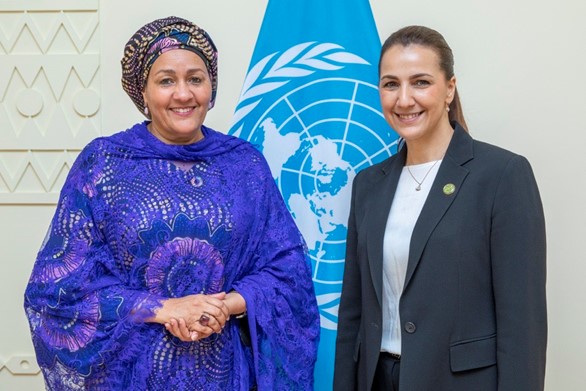SEED FUNDING JOINT PROGRAMMES
Jordan
Transforming Jordan's Agri-food System towards greater sustainability and resilience



PROJECT TITLE | Transforming Jordan's Agri-food System towards greater sustainability and resilience |
| Context | Since 2021, Jordan has placed food security and system at the forefront of its developmental goals with the adoption of the National Food Security Strategy (NFSS) for 2021–2030. The NFSS envisions access to safe, affordable, and nutritious food for all by 2030. The 2022-2024 National Food Security Action Plan for the implementation of the NFSS prioritizes food availability, improved access to and better utilization of food, and strengthening governance mechanisms. |
| PUNOs | FAO, UNIDO |
| Contribution to SDGs | SDG 2 Zero Hunger, SDG 8 Decent Work and Economic Growth |
| Contribution to other SDG transitions | Decent Jobs and Universal Social Protection |
| Duration | September 2024 – August 2025 |
| Expected financial leverage | USD 30,000 – co-financing from FAO, UNDO, MoA |
| Alignment with SG Call to Action | Policy integration; Food systems governance; Research, data, technology and innovation; Inclusive and participatory design; Private sector engagement; Financing |
| Outcomes | The JP strengthens the government’s capacity to identify and implement strategic programs that deliver positive outcomes across multiple dimensions of food systems, including production, post-harvest, processing and distribution. The JP emphasizes the inclusion of refugees, women and youth in food systems. |
| Partners |
|
| Outputs |
|
PRESS RELEASE - COP28 Presidency and UN Food Systems Coordination Hub Join Forces to Harness the Power of Food Systems Transformation for Climate Action
A new strategic partnership will elevate the role of food systems as one of the most impactful accelerators of the SDGs and a critical area for Climate Action.

Pictured: UN Deputy Secretary-General, Ms Amina Mohammed and H.E. Mariam Almheiri, UAE Minister for Climate Change and Environment and COP28 Food Systems Lead, at the UN Food Systems Summit +2 Stocktaking Moment, 25 July.
©FAO
Rome and Abu Dhabi, 26 July 2023 –The COP28 Presidency and the United Nations Food Systems Coordination Hub (The Hub), are pleased to announce a new strategic partnership, aimed at elevating the role of food systems as a catalyst for achieving the SDGs and the targets for the Paris Agreement.
The goal of the partnership is to convene mutually supportive processes with respect to food systems transformation and climate action, in the broader landscape of global events and milestones related to sustainable development, including the SDGS Summit, the 2024 UN Summit of the Future, the 1st and 2nd UN Food Systems Stocktaking Moments in 2023 and 2025, and the COPs from 2023 to 2025.
Speaking on the announcement, H.E. Mariam Almheiri, UAE Minister for Climate Change and Environment and COP28 Food Systems Lead, said, “As we navigate the complex challenges of the 21st century, it is increasingly evident that sustainable and resilient food systems are pivotal to achieving a more prosperous and equitable world. By leveraging the UAE's leadership as the host of COP28 and the UN Food Systems Coordination Hub's expertise, this strategic partnership aims to foster collaboration, innovation, and transformative action across food systems, setting us on a path towards a sustainable future for all.”
The COP28 Food Systems and Agriculture Agenda, launched in Rome this week, prioritizes key food systems objectives, including aligning national food systems and agricultural policies and planning processes with Nationally Determined Contributions (NDCs) and National Adaptation Plan (NAP) by 2025. The UN Food Systems Coordination Hub will contribute to the several tracks of the Action Agenda and will support the Presidency on engagement with State and Non-State Actors. Based on concrete examples and inputs from central players, the partnership will be looking for gathering and upscaling solutions and actionable recommendations for supporting policies and action as scale that will simultaneously produce food systems and climate gains.
“Building upon the outcomes of the UN Food Systems Summit+2, it presents a unique opportunity to mobilize global leaders, policymakers and stakeholders to translate global commitments for climate action and food systems transformation into tangible actions for the SDGs,” said the UN Deputy Secretary-General, Ms. Amina Mohammed.
A central aspect of this strategic partnership is to secure the commitment of Heads of State and governments attending COP28 to implement these actions by facilitating the signing of the first-ever Leaders Declaration on Food Systems, Agriculture, and Climate Action. This declaration will serve as a landmark commitment, consolidating global ambition and firmly establishing food systems as a prominent item on the climate agenda and within the COP process for years to come.
Contact
For media inquiries, please contact:
COP28 UAE
UN Food Systems Coordination Hub
